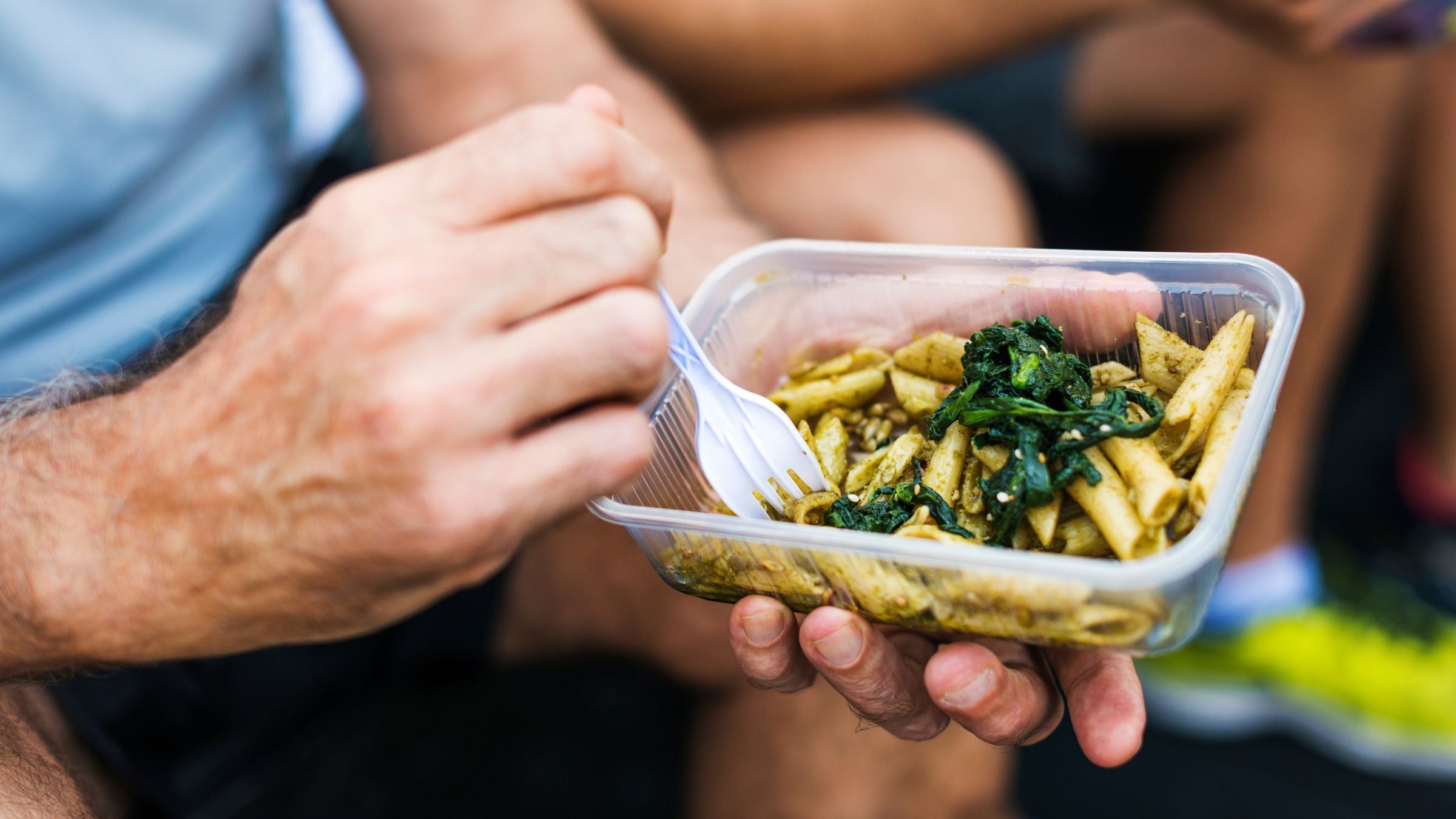We Need to Scrap Our Old-School Off-Season Diets

Nutrition expert Susan Kitchen explains the best off-season diet for triathletes. (Photo: Getty Images)
After completing your last triathlon of the year, it’s time to relax and enjoy the off-season! This training phase allows a nice break from early alarms and long training sessions, creating a more laid-back schedule. The off-season presents the ideal opportunity to concentrate on areas of health and performance that may be difficult to address during peak training – things like health, body composition, and daily habits. Whether your goal is to build muscle, improve lab values, or enhance metabolic efficiency, the off-season is a great time to establish supportive nutritional habits to make next season your best yet.
Instead of thinking of the off-season as a time to eat less, think of it as a time to eat better. Let’s look at some nutritional elements you can focus on in the next few months.
What (and how) to eat during the off-season
Carbs
Adjusting carbohydrate (carb) intake to match lower energy expenditure is essential for maintaining energy balance. In heavy training, endurance triathletes typically consume 8-12 grams of carbohydrates per kilogram (kg) per day; however, a target of 3-5 grams per kg per day is more appropriate during the off-season.
The off-season is also a great time to focus on nutrient-dense whole food sources like vegetables, fruits, lentils, beans, and whole grains. Experiment with recipes and discover ways to get these whole foods into your diet routinely. For example, if you do meal prep during the season to save time, the off-season is a great time to evaluate your go-tos and look for ways to get more nutritional bang for your buck.
Protein
Protein should be a staple on your plate, regardless of the training phase you’re in. Protein plays a key role in stabilizing blood sugar, controlling hunger, and, most importantly, supporting muscle protein synthesis. Aim for 1.4 to 2.0g protein/kg/day, depending on your body composition goals. Kickstart your day with 30+ grams of protein, followed by protein at lunch, dinner, and after workouts (especially strength training sessions). Low-fat dairy, Greek yogurt, cottage cheese, soy milk, lean meat, fish, eggs, tofu, tempeh, and protein powders made from whey and/or pea protein are great choices.
Even if you’re not training very much in the off-season, protein matters. The protein leverage theory suggests that our bodies have a specific target protein requirement. When our diets lack sufficient protein, we often compensate by consuming excess calories from fats and carbohydrates in an attempt to meet those protein needs. By prioritizing adequate protein intake, we can help mitigate overeating on empty, low-fiber calories and help curb cravings.
Fat
Avoid falling back into the non-fat diet trends of the 1990s this off-season. Dietary fat, in the appropriate amounts and types, is crucial for a healthy, functioning body. Aim for around 1g per kg of body weight per day, focusing on unsaturated fatty acids that support heart health. The best choices for dietary fat are olive oil, avocado, nuts, seeds, fatty fish, and nut butter spreads.
Alcohol
At the risk of being a buzzkill, it’s important to recognize that no amount or type of alcohol is considered safe or healthy. Beyond the potential health risks, ethanol negatively impacts sleep, recovery, and hydration status while disrupting appetite regulation, which can lead to cravings. That said, it is the off-season and the holidays, and if you enjoy a glass of wine or a beer, feel free to indulge—but do so in moderation and alongside healthy food choices and habits.
Fueling your workouts in the off-season

Sport fueling is essential to our training and racing performance. However, additional nutrition support during training is typically unnecessary in the off-season. Here are the guidelines for fueling in off-season sessions:
| Up to 75 minutes | Consume water (electrolytes, as needed). |
| Up to 2.5 hours (endurance Z1-2 effort) | Consume water with electrolytes and 30-60g carb/hr. Depending on your body composition goals, adjust carb intake accordingly. If you are fueling at the lower end of the range, ensure that the effort is truly aerobic. |
If training in a fasted state, a lower-carb concentration sport drink may be appropriate, especially if the session includes high-intensity efforts and follow-up with a balanced (carb- and protein-filled) post-workout meal/snack.
Take a deep dive into health optimization
While establishing healthy habits around diet, sleep, stress management, and training is essential during the off-season, let’s take it a step further for a comprehensive approach to health optimization. To leave no stone unturned, take a deeper dive internally with comprehensive blood testing, a Dual-Energy X-ray Absorptiometry (DEXA) scan, and other tests necessary to address your specific health concerns.
Blood work screening assesses nutritional status and identifies deficiencies in essential nutrients, monitors important health markers, and guides dietary adjustments based on your results. DEXA is the gold standard for measuring bone mass density, lean body, and fat mass (subcutaneous and visceral). The results help identify bone-related health issues, such as osteoporosis or osteopenia, which are critical for injury prevention. Athletes can use DEXA scans to track body composition changes, particularly muscle and bone mass. Finally, changes in body composition gleaned from a DEXA scan provide insights into nutritional habits and help identify where dietary adjustments may be necessary.
Seek the advice of a board-certified Sport Dietitian for nutrient and supplement recommendations based on lab testing and BMD/Body composition evaluations.
Aim for “practical,” not “perfect” in off-season diet
Regardless of the time of year, aiming for perfection is unrealistic – there’s no such thing! Instead, embrace a practical approach like the 80/20 rule to set yourself up for success: Strive to make healthy choices 80% of the time, while enjoying indulgences in moderation in the remaining 20%. Most importantly, prioritize cultivating a healthy relationship with food. Recognize that occasional detours are part of the journey, and getting back on track is equally important – without beating yourself up.
Remember, the goal for your off-sesaon diet is to make nutrition adjustments that align with your goals and optimize your health. Be intentional in your eating habits and make smart food choices; this proactive approach will carry over into the pre-season and race season, resulting in a healthier, more successful athlete in the long term.